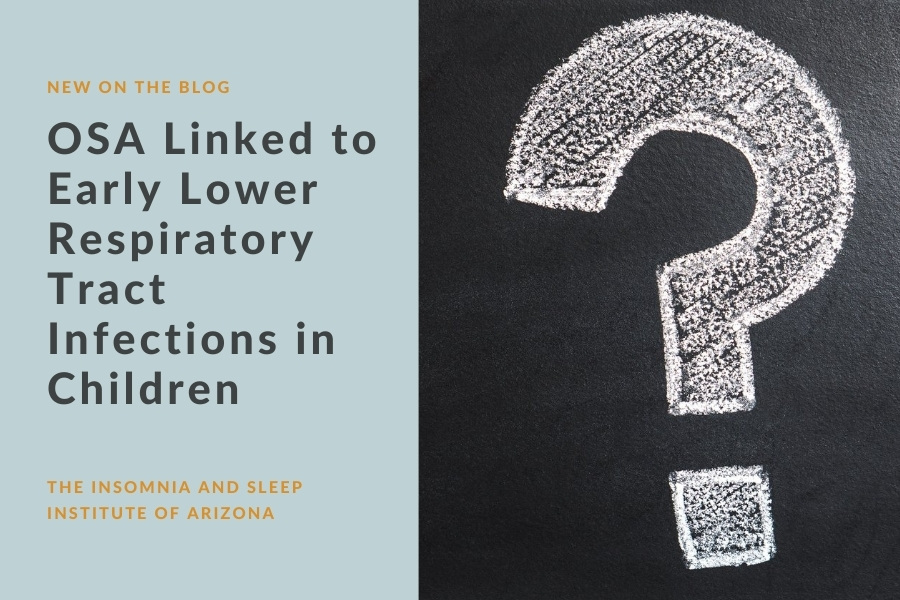Numerous conditions have been linked to early lower respiratory tract infections (LRTI) in children via birth cohort studies, including obstructive sleep apnea (OSA). The Insomnia and Sleep Institute of Arizona treats patients as young as two years old because sleep disorders can occur at virtually any age. The sooner anyone gets a correct diagnosis and treatment, whether a child or an adult, the quicker they can safeguard their health. Even though OSA in Phoenix and around the world is very common, that does not mean it isn’t serious.
Every consultation at The Insomnia and Sleep Institute is with a sleep specialist who can diagnose disorders to ensure that next steps (including testing and treatment) can occur. We are an outcome-driven facility and proud to serve as the Face of Sleep Medicine in the Phoenix region. Setting the standard for sleep medicine means having unparalleled staffing levels so that you (or your child) can get the care you deserve.
The LRTI and Obstructive Sleep Apnea Connection
Until recently, the connection between LRTIs in children and development of OSA had not been well-studied. However, researchers at the Children’s National Hospital have now pinpointed an association between these two issues. The full study is published in SLEEP, where researchers wrote, “These results suggest that respiratory syncytial virus LRTI may contribute to the pathophysiology of OSA in children. The study shows that children with ‘severe RSV bronchiolitis’ as an infant were twice as likely to develop OSA before entering Kindergarten. This was highly suggested regardless of other risk factors.”
According to the director of the Children’s National Hospital, this “raises concern for the possibility that primary prevention strategies can hinder the initial establishment of OSA following early viral LRTIs. Researchers stress that preventing OSA in kids has a “dramatic effect in reducing the increasing incidence of this condition and preventing its detrimental effects on childhood health and beyond.” The majority of those diagnosed with OSA in Phoenix are adults, but there are many who are undiagnosed and mis-diagnosed—particularly children. Some pediatricians who do not specialize in sleep medicine might not think of OSA as a common occurrence in children, even though many children do have OSA.
A Push for OSA Diagnosis
The researchers who established this link say that knowing this connection can help to create strategies to anticipate OSA and intervene as early as possible. Young children and infants who have had these viral infections are simply at a very increased risk of developing OSA. This means that working with a sleep specialist who treats pediatric patients can be a great means of “catching” OSA before it becomes severe. This can include seeing a sleep specialist routinely, just like your pediatrician and pediatric dentist, so that parents can stay on top of this risk.
The director of the National Center on Sleep Disorders Research at the National Heart, Lung, and Blood Institute, Marishka Brown, states, “The findings from this study suggest that viral lower respiratory tract infections could predispose to the development of sleep-disordered breathing in later childhood.” She does recommend that more research be conducted to see exactly how these infections inform airway functioning.
OSA Phoenix Treatment
Adults struggling with OSA are often treated with CPAP therapy, whereas children may be treated with tonsil surgery or CPAP therapy (depending on the cause). There are many lifestyle factors that can coincide with OSA, such as obesity and smoking, but such factors are typically found in adults rather than children. Some children with OSA will benefit from CPAP treatment, and today’s technologies are customized to be comfortable and fit easily into bedtime routines. OSA occurs when the airway is blocked during sleep, which causes poor sleep and all of the side effects associated with sleep deprivation.
Sleep is critical for everyone, but especially for children who are still developing. Common signs of sleep apnea include snoring and daytime sleepiness, both of which parents can monitor if they are concerned about the development of OSA. However, sometimes symptoms of OSA are mild or do not fall into the most common categories. The best way to know if your child has trouble with any sleep disorder is by scheduling a consultation with a sleep specialist. Contact The Insomnia and Sleep Institute today by calling the office or completing the online contact form.





